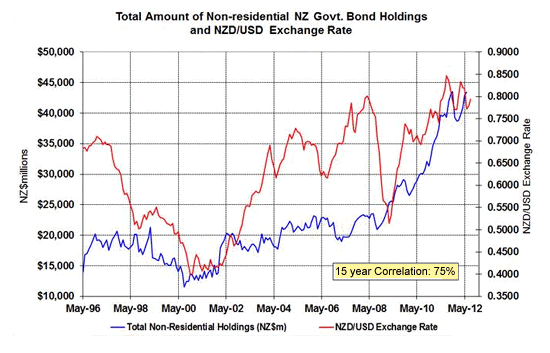
 By Roger J Kerr
By Roger J Kerr
The movement up in the Kiwi dollar and Aussie dollar last Friday, despite slower growth to 7.6% pa in China, just tells you that the commodity and currency markets had already full priced-in the Chinese data beforehand.
These markets are now more certain that the Chinese will ease monetary policy further, which is positive for global commodities as it underwrites Chinese demand.
The other major factor maintaining the NZD and AUD at elevated levels to the USD is the fact that central banks and sovereign wealth funds in Asia are allocating investment funds in favour of our higher yielding currencies and away from the EUR and USD.
The increase in volumes of NZD’s being purchased by these overseas investors to buy NZ Government Bonds is evidenced by the chart below.
The amount of NZD denominated debt issued by the NZ Government has of course increased markedly since 2008 and these foreign investors have purchased most of the increase from $20 billion to above $40 billion.
The Asian investors into our bonds generally do not hedge out the NZD currency risk and therefore their flows have a direct positive impact on the exchange rate at the time of purchase.
As the economy grows over coming years and tax revenue into the Government increases the rate of new borrowing by the Government will reduce; that is, the rapid rate of increase in issuance (and thus foreign buying) seen over recent years will not repeat going forward.

Coupled with positive NZ economic fundamentals of selling food to rapidly growing Asian cities, the allocation of these investment funds to NZD’s stands as a major factor as to why we see the NZ dollar as stable in the medium term and stronger in the longer term.
--------------------------------------------------------------------------------------------------------------------------------
To subscribe to our daily Currency Rate Sheet email, enter your email address here.
--------------------------------------------------------------------------------------------------------------------------------
* Roger J Kerr runs Asia Pacific Risk Management. He specialises in fixed interest securities and is a commentator on economics and markets. More commentary and useful information on fixed interest investing can be found at rogeradvice.com
4 Comments
Underpins or "overprices"? forcing us 'as a nation' to increase taxes on the people, forces us to sell our best infrastructural assets to please the IMF and the US FED so we can fund ever more credit swaps in return to pay for our benefits to prop up cost of living affordability.
Yeahhhhhh. Good ONE Roger! Well thought out my friend
Verbal Viagra ! Discussion about the dollars daily flucuations sound like conversation in an erectile disfunction clinic. "It's up. It's down. It's wilting."
Language itself defines a lot of thinking. When the Kiwi dollar is said to be 'up' -- in fact it's New Zealanders who are getting shagged.
When the dollar is 'strong' -- there is some exporting business who is suffering. A 'stong dollar' sometimes seems to indicate everything is great. But it's not so.
Lets change the language. I would like to hear on the news. "The New Zealand dollar improved markedly today as the exchange rate went from 80c to 78c US"
Couldn't agree more with Justice, KH, and Basel Brush above. From a current account point of view, this is a self fulfilling vicious circle, where the more we sell these bonds to foreigners, the higher the exchange rate, the less actual stuff and services we can afford to sell them, the more we need to borrow. The Reserve Bank has been useless in managing that cycle, championing with no good reason as high an exchange rate as they possibly could. Hoorah, inflation is at 1%; on the back of borrowing $300 million a week as a country. If the government does actually fix its deficit, then the problem will only swing back to the private sector so fixing that government deficit is a mere sideshow.
Well past time to break the cycle, and concentrate on the current account. It would cause us a lot less pain than some think..




We welcome your comments below. If you are not already registered, please register to comment.
Remember we welcome robust, respectful and insightful debate. We don't welcome abusive or defamatory comments and will de-register those repeatedly making such comments. Our current comment policy is here.